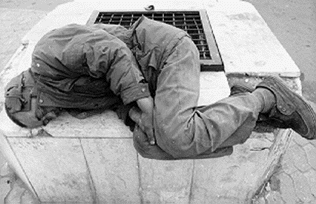
![]()
PROBLEMS OF THE SOCIAL SPHERE

|
PROBLEMS OF THE SOCIAL SPHERE |
|
an interview with Vasiliy Ivanovich Zhukov, Rector, Moscow State Social University
 |
Reference. The Moscow State Social University is the first and only Russian university specially addressing problems of social sphere. Specializations of its departments include: social activities, social economy, psychology, law, sociology, journalism. The University also includes in its structure: Department of post-graduate professional improvement, Department of by-correspondence education, International Center for Education and Cultural Communications, and the "Rossiyanka" higher education courses for women, providing professional training and improvement on post-graduate basis. University faculty staff is rather impressing: nine academicians, 105 doctors of science in professors' tenure, more than 150 Ph.D. as associate professors. Doctors are 51 years old on average. |
Would you, please, tell us the history of your university? When was it established? Who did it?
By 1990, I and my colleagues of the Moscow Higher Party School had laid out a background and scheduled supposed curricula for new educational program, the Social Activities. The specialization was rather new for Russia and did not found proper response in academic and governmental circles. 1990 was not the time for Russian government to trust academicians of party school and adopt their projects. So we had a long battle before we could start training specialist in social sphere. Persistence and consistency, that's what helped us in step-by-step promotion of the idea of an educational institution for training specialists that would meet changing public demand. Eventually, more and more people were coming to understand needs of the social sphere, social policy, social work. Finally, we drew to our side enough influential supporters, and in November 1991, the Russian State Social Institute was established. From July 1, 1994, we are the University.
What do you mean exactly when you say the "social sphere"?
The "social sphere" is rather inclusive term. First of all, it designates economic and technical resources available and social infrastructure in place that compose the framework of the system of social security and public services provided to the population.
Does "population" mean "everyone" or some specific groups?
Back in 1991, we did not have any social security system; what we had was the system os social assurance. Social assurance addressed only specific subpopulations -- disabled, elders, mothers with copious children, single.
By the way, have any new criteria been developed in last decade to help specify categories of people "in bad need".
In this, we are conservators. Though certain negative trends have emerged. We had no refugees or "forced migrants" before, and social assurance system did not have a slightest idea of what to do with people of this class. By now, we have learned much of it. We've never had this many unemployed before. Now we have to work with them. From 1985, the total number of those living entirely on social aid has increased dramatically. And the number of social groups dependent on governmental support has also increased. Now, let me finish the previous answer. Today, the Government does not have enough resources to provide support to everyone which results in persisting common perception of current social security system as "addressing the poor." However, the social security system is something essentially different from the social assurance model. While social assurance purpose is to protect and support specific categories of people, the social security system addresses entire civil society. Social security must support every citizen irrespective of his/her welfare. For some, social security means guaranteed sustainable level of living. And for Bryntsalov1, for instance, social security might mean protecting his legal status as business owner. The social security system should cover everyone in civil society.
The term, "civil society" seems to be somewhat overused these days. And it is rather ambiguous as well. To avoid any misunderstanding, could you, please, clarify its meaning in brief?
The civil society has a number of basic principles. First of all, it is law-governed society. In civil society, everything is subject to legal regulations, and not that kind of regulations interested individuals and groups may adjust and apply the way they like. Second, in civil society rights of individuals prevail over societal interests. Third, the civil society implies powerful middle class as structural framework supporting all social activities. These are three basic principles, and, of course, there are many others. For instance, mass media and communications must provide for transparency of governmental activities so they could be controlled by public in a democratic way. Then, of utter importance are provisions regulating ballot and election procedures, moral and ethics--
Thank you. Going back to social security, as far as I understand, its function is simply to secure social rights written in the Constitution, isn't it?
Constitutional rights are being secured and enforced not through the system of social security, but rather through the entire regulatory system imposed by governing authorities. And here lies the gap, or rather multiple point-by-point gaps, between statutory and actual. On one hand, we state that we are heading towards the situation where individuals will be in position to perform at best of their abilities and provide for themselves. On the other hand, it turns out that most people face somewhat different problems. They simply need protection from poverty and hunger which now endanger people on frightening scale. That is why we can't speak about social security system in Western sense of the word. We have neither physical nor economic and financial capacities for running all-encompassing social security system, because in West resources for such a system are drawn from within middle class. And in Russia, we don't have middle class yet. That's why we can't have effective social security, too. Therefore, what we call social security now is, in its essence, the same old social assurance system. In fact, the new system simply keeps on addressing the same underfed populations the old system used to address.
| What social problems, to your opinion, are most relevant today?
The first and the gravest one is the problem of peoples' incomes, poverty and economic stratification. There are certain indicators measuring relevance of this problem. Income level, as you know, is determined through minimal consumer budget, average monthly revenue, and cost of minimal food supply. There is a clearest indicator of societal welfare: a decimal index. It is very simple to calculate: the entire population is stratified by income in ten layers; in-between levels are disregarded, so we have one-tenth of people with maximum incomes and one-tenth people with minimal incomes. Decimal index is defined as the ratio of average income of one-tenth on the top of social pyramid to average income of those at the bottom ten percent. |
 |
Until 1985, we suffered from political equalization of incomes, and in 1986 the decimal index in the USSR reached its lower point of 3:1. In healthy society, level this low clearly indicates at abnormal situation: it reflects egalitarian philosophy and implies unproductive consumption trends. From 1986 on, decimal index gradually increased, slowly at first, and abruptly in 1992. In 1994 the index reached its peak level -- 15:1. Today we have the decimal index of 13:1 characterized also by abnormally high regional variations (for instance, in Moscow the index is 28:1).
To understand the implication, let us compare these figures to what we observe elsewhere in the world. In USA, in past 40 years the decimal index have kept within range of 6:1 - 8:1. American leaders feel responsible for not letting it higher than 8:1, because they know it to be the highest level promising political and social stability. In Europe and Japan, indexes never elevated above 10:1. In China, the current index is 5:1. And in Central and South America average decimal index is 12:1. We know, this region suffers regular political calamities. Why? Because once decimal index is above ten to one, a nation surges into hazardous zone of unstable social development and neither government nor people lose control of whatever may happen next to their sheer surprise.
In this country, in addition to excessive decimal index which is far higher than any civilized country might allow, we witness a queer social disposition when economic stratification goes all by itself with no signs of appropriate social consolidation. I mean, if we scrutinize the most deprived ten per cent of the nation, whom will we find there? There'll be outsiders and marginal groups, unemployed, refugees... along with schoolteachers, university professors, medical professionals. And when it comes to make political choice, this economically homogenous layer splits: some vote for Gaidar, others vote for Zhirinovsky, those vote for Zuganov, and so on. The same is true with the upper stratum. There we find corrupted officials and talented artists, prominent researchers and leaders of underworld... They all have comparable incomes, similar living standards and even habits. But as electorate they have nothing in common.
Therefore, economic stratification has not resulted in forming socially homogenous civic groups or classes. But once there are no homogenous social groups, there are no political forces representing interests of different layers of citizenry. And once there are no such forces, there is no way to harmonize or align interests of multiple societal groups. I am sorry, but I can't help coming to conclusion that our nation faces situation described in Gobbs law: everyone fights all.
What are other social problems? Crime is the most complicated problem all by itself. I am not the first to say that the past decade was the time of deliberate governmental support of making crime inalienable component of every aspect of social life. Official reports show steady increase of criminal rates beginning in late 80's and abruptly surging in early 90's. Meanwhile, number of sentenced criminals decreases every year.
All these talks about government's inability to stop crime and ineffectiveness of criminal law have no grounds. Authorities have enough power to subside crime and make it take its proper and somewhat meeker position. What they actually lack is political will to do so. And all this is explainable and understandable, because authorities, after all, need some socially consolidated base to implement reforms the way they do it. If reforms were being implemented in somewhat different way, other social layers might have been engaged on the role of social basis and we might be witnesses to quite different political attitudes to the criminal world. Top-to-bottom corruptibility of governmental officers doesn't happen overnight. It is the result of deliberate political strategies. The unpleasant truth, but it is true.
| The next problem is abnormal -- or deviant -- social behavior. Abnormal behavior doesn't come from deliberate personal choice. It is natural reaction of people to environments they have to live in and also the result of adverse influence of these environments on their public outlooks. Deviations include alcohol and drug abuse, and many other behavioral changes. Alcohol intake started its climb in 50's. First it grew very slow, in 60's it gained acceleration, and in 70's evolved into one of most negative trends in development of the Soviet society. |  |
In 1984 we "won" European cup in alcohol intake for the first time -- achieving 13.6 litres per capita -- but still had world leaders, including USA and Canada, benchmarking our future targets. Finally, last year we have beaten all records and now we are "world champions" with 22.3 litres of alcohol per capita annually. Well, high alcohol consumption itself does not constitute a social problem. French, for instance, have been achieving stable high results for 20 years now (13,2 litres per capita annually). They drink wine at lunch and on. But drinking wine is element of their national culture (and even digestive processes), and not of alcohol-related medical and social problems, because drinking wine does not result in abnormal behavior. In this country, both traditional cultural aspects of alcohol intake and low quality and high quantity of liquors result in alcoholism being a component of deviant behavior. And this makes a social problem.
Taking wider, deviations increase in every aspect of public life. They result in citizenry of inadequate social behavior. And here's our electorate. Once social abnormalities on the edge of mental clinical cases tend to dominate, we obtain electorate with acute political symptoms. And no wonder that Zhirinovsky is this popular. At least, sane people understand the reason why.
What is, to your opinion, the social sphere's priority in imaginary list of political strategies of our government?
Well, you must be a hypocrite to say that government has any social strategy at all. Even for professional apologists of government course, it seems to be at least absurd to claim that our government has a sound social concept. Russian government does not have and never had any social strategy. It simply lacks. What we have is emergency social activities aimed at softening negative impacts of our rushing into market economy.
Have you read the draft Program of Social Reforms in the RF for 1996-2000, and, if you have, what is your impression?
That Program had been drafted by very limited number of people, but the following discussion of the draft was organized to the best of former soviet traditions. Dozens of research teams, including us, thoroughly studied the draft and made their conclusions. My conclusion, I believe, was the strictest in program's evaluation and judgement. Not that I rejected the program itself or approaches proposed. I simply believe that, however moderate in scope of addressed problems, the program is still unrealistic. To my opinion, the fatal defect of the program is that without appropriate economic and financial mechanisms providing its implementation it is dead-born and doomed. Another question is, "Can someone propose anything better under current economic conditions?" Well, the answer is, "Definitely, no."
What is your perspective of opportunities of reformation of the social sphere? What could you advise?
First of all, we need perform thorough, honest, objective, politically unengaged analysis of what we have been doing in past 12 or 13 years. In other words, perform history and examination. Have you ever seen a doctor ordering treatment without prior examination and diagnostics? When Boris Nikolayevich needed surgical intervention, as you must remember, a medical council of highest possible qualification was immediately gathered. And I must tell you that economic and financial functions of our nation's body are impaired in much worse way. Therefore, thorough history and examination must be taken. And this sort of analysis is now under way. Carnegie fund pays for it, Soros fund pays for it, Humanitarian fund pays for it, even our government sometimes pays for it. The problem is that our political leaders remember only those of analytic conclusions they find suitable for them.
The second requirement is that we stopped being revolutionary in everything we do. We must understand that the only possible way to social progress and sustainable development lies through evolution.
Remember Heidegger's, "For centuries, humankind used to overact and underthink." Russian is the only nation to open this century with violent political revolutionary experiment and close it with social and economic revolutionary experiment. If we manage to give up our revolutionary thinking and turn to evolutionary development then we shall have some chance of producing reasonable, civilized societal policy. These two first step don't require much financial resource, they require good political will and public promotion.
Strong social strategies also require strong economic and financial system. Today we have 11 to 50 per cent product, sector-specifically, of what we had in 1990. When economic system is failing, when industrial objects are closing, when gross national product is being composed mostly of services and not production, how can we expect national budget being replenishing? The major prerequisite to effective social policy is reviving economy, restoring revenues to the national budget -- and not by new fiscal stratagems; no government in the world ever succeeded in national budget forming and financial problems solving based on tax increases and better tax-collection -- budget shall be raised through industrial product growth.
Who is responsible for making transformations in the social sphere? I mean, functionally?
Our politicians somehow came to the wrong conclusion that judicial, legislative and executive authorities should be considered separately. In this, they are fatally misguided. Authorities should be authorities, and no use subdividing them labelling as "judicial" or "executive". Government means government. Operationally, yes, they may be categorized into certain functional branches. And the art of politics consists not only of skillful planting every branch into its own field of operation, but mainly in providing for fruitful interactions between authorities, in coordinating their activities. Well, in separating governmental branches, we succeeded, you know. Now, what about coordination? For example, legal framework of the social sphere entirely depends on legislators. I could name as many as 80 legal acts regulating all types of social relations in this country. And in these 80, you will not find a single provision on labor that regulates employer/employee social relations in a mutually acceptable way.
All legislation is built so that working honestly means bankruptcy, paying taxes means bankruptcy, even economic gain means bankruptcy. Anything legal means bankruptcy! The only way to financial survival lies through finding some neck-saving options for partial feeding governing authorities. Because we have governmental racket of unprecedented scale (fire inspection, epidemiological inspection, tax inspections, tax police, and so on); no organized crime could ever thought better.
Now, getting down to individuals, what do we have to do as citizens? We have to move quick. For instance, each of my professors read lectures in several other universities just to have these 3 million roubles2 monthly and make ends meet. And they are representatives of the social group that in any other nation is considered to be in upper middle class. Is there any hope for better future for them? Not in five years coming. That's why we can't speak about any social strategies in five years to come.
We've been talking about government all along. Can't we find some other resources available to promote reforms in the social sphere? Third sector, for instance?
Speaking of third sector's opportunities, yes, potentially it may have resources of influence on the social sphere. But current facts make me doubt if third sector actually disposes any sustainable financial, economic, or even human resources. In episodes, yes, but as a constant factor of influence, it simply doesn't exist yet. In civilized society, third sector is a regular element. Its share in national economies is usually three to seven per cent of gross product. We can't expect Russian third sector ever to reach this percentage. But it doesn't mean we have to criticise those involved in third sector bringing their knowledge, intellect, abilities to it. On the contrary, we need to support these individuals in every possible way hoping third sector will evolve to produce some societal phenomena -- first, on individual scale, and only then financial, economic and others.
Interview by Julia Kachalova
| BACK TO THE CONTENT |
|